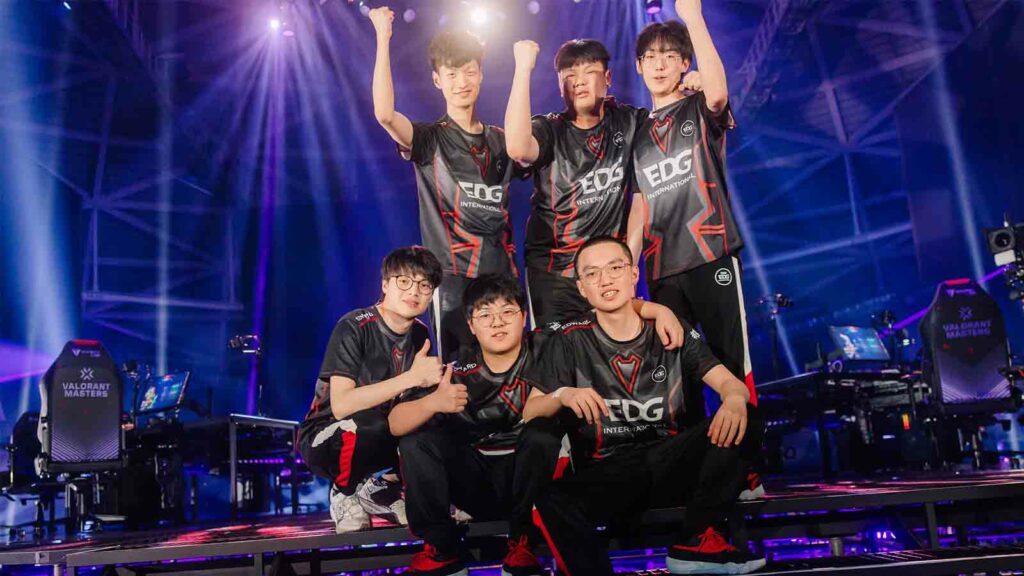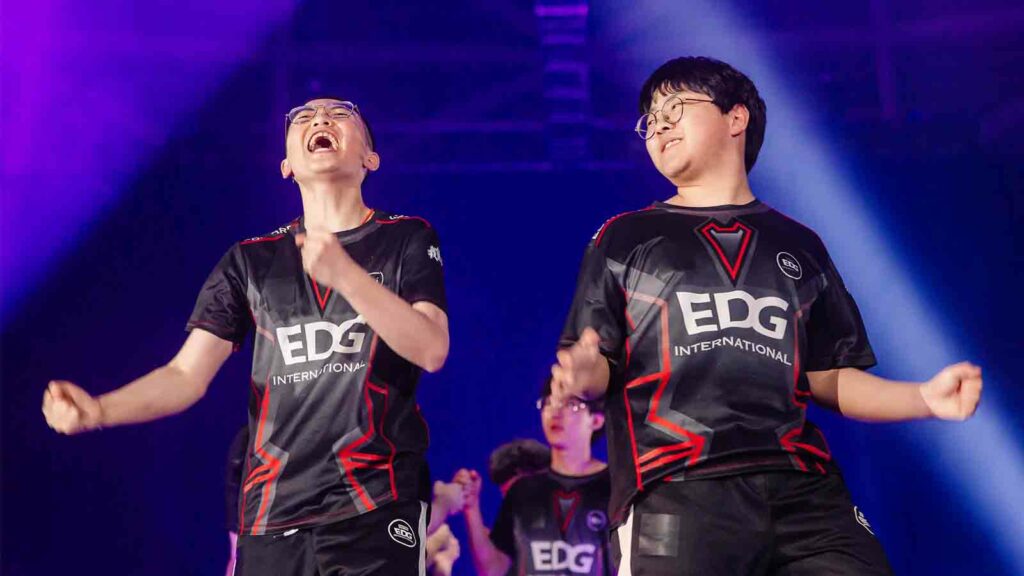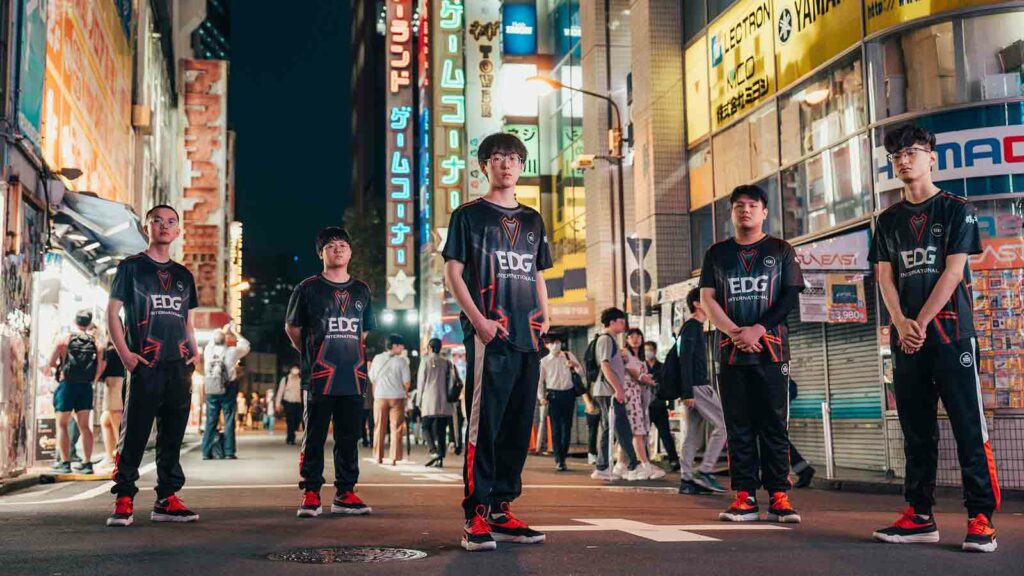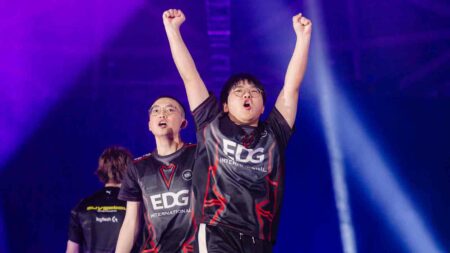Updated on August 14, 12:06 p.m. (GMT+8): Improved relevancy.
China doesn’t have its own VCT franchised league yet but the Edward Gaming Valorant roster is already making waves internationally.
Winning the East Asia Last Chance Qualifier 2022, they qualified for Valorant Champions 2022, but bowed out quickly in the group stage after losing both their matches to Paper Rex and Team Liquid.
At the first international LAN event of 2023 at LOCK//IN São Paulo, EDG and FPX were invited to participate, but were again eliminated quickly after they lost their first match.
For Masters Tokyo 2023, EDG finished top two at the FGC Valorant Invitational alongside Attacking Soul Esports to qualify — and this time, they did not disappoint.
Even though the Edward Gaming Valorant roster lost their first match to T1 in the group stage, they bounced back against Navi before winning the decider against T1 to qualify for playoffs where they’ve made it further than ever before, finishing top six: they eliminated VCT Americas 2023 champions LOUD in the first round of the lower bracket before getting eliminated by Paper Rex a second time internationally in the second round.
EDG’s controller and sentinel player Wan “CHICHOO” Shunzhi spoke to ONE Esports in an exclusive interview about the different ways Chinese teams have been upping their game despite the absence of VCT in their region and the story behind his IGN.
The Edward Gaming Valorant roster has a lot more experience than you can imagine — because of geography

How Chinese Valorant teams got good
Valorant was first released worldwide during the height of the COVID-19 pandemic in the summer of 2020 when majority were quarantining at home. However, a Mandarin client and server were not part of its global release.
Each region in NA, LATAM, Brazil, Europe, South Korea, and APAC were allocated dedicated servers. For larger regions like NA, APAC, and Europe, there are multiple options for players to choose from to optimize their ping.
Even though China didn’t have its own server, they’re close enough to South Korea and Japan to play on a reasonable ping, so upon launch, Chinese teams were already connected with the rest of Asia.
“We’ve been scrimming together all along since 2020. Because we couldn’t compete in international tournaments, we were reliant on Asian teams that competed at global events,” CHICHOO told ONE Esports. “When they came back to practice with us, we would then assess our strengths — this is why we’ve always been confident about our standard of play.”

How Edward Gaming evolved from being aggressive to being able to go toe-to-toe with the best on the international stage
CHICHOO entered the behind-the-scenes practice circuit in 2021 when he joined Edward Gaming.
Despite living in a MOBA-dominated country, he was introduced to first-person shooters at a young age and prefers the genre because it’s more exciting and satisfying for him. His first FPS was PUBG, and when he started to develop career aspirations, he made the switch to Valorant, which was new and contained more opportunities.
When EDG was first formed, they adopted the conventional aggressive Chinese playstyle — taking raw peeks and duels — which CHICHOO personally dislikes.
At present, he thinks that every Chinese team is different and has their own playstyle. “When we started to play against better teams, we realized that it’s not viable, so we had to change,” he said. “As you can see now, we play a bit slower.”
The biggest challenge for EDG during competitions however, isn’t so much about changing up strategies, but rather, maintaining their mental strength. Losing to T1 in their opening group stage match at Masters Tokyo was hard to swallow.
“After that day, we had a meeting and discussions because we couldn’t lose another match, we only had one more chance,” CHICHOO shared. “So when we defeated Navi, our confidence was completely refreshed and we felt like we could beat any team.”
During matches too, the players who are feeling it would encourage others who are not. Head coach Lo “AfteR” Wen-hsin steps in as well if their mental falters.

What does CHICHOO mean? The story of how he came up with his IGN
When CHICHOO first started playing Valorant, he first had to pick an in-game name. “I’m the type of person that finds it really difficult to pick an in-game name. Every time when it’s time to pick an IGN in any game, I’ll feel really vexed,” he said.
A big fan of Blackpink, he eventually decided on “CHICHOO”, a common nickname for Jisoo, his bias.
He went through an experimental phase and played around until he discovered how much the controller and sentinel role brought out his strengths.
During the time when he switched and settled on these two roles, he needed “a teacher,” so he watched Ayaz “nAts” Akhmetshin’s videos. After all, he’s a Masters champion, so he decided to learn from him, paying a lot of attention to how he adjusts his positioning
At LOCK//IN São Paulo, he finally got to meet the pro player he admires. “In Brazil, I was shy and didn’t say much, so we took a photo together and I got his autograph. So coming to Masters Tokyo, looking back on the first meeting, I decided to exchange jerseys. Since my English is still not that good, we can’t communicate, so that’s still a problem,” CHICHOO laughed.
Follow ONE Esports on Instagram and TikTok for more Valorant exclusives.
READ MORE: The story behind EDG ZmjjKK’s name is the most wholesome thing you’ll hear today


